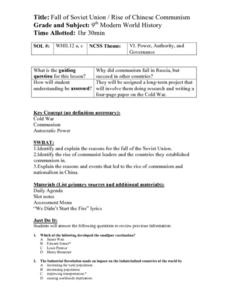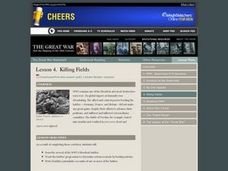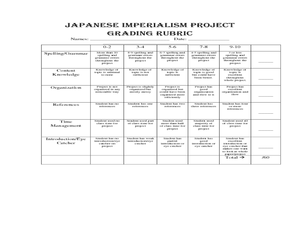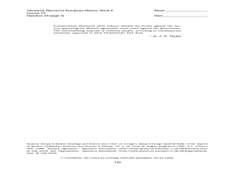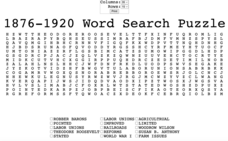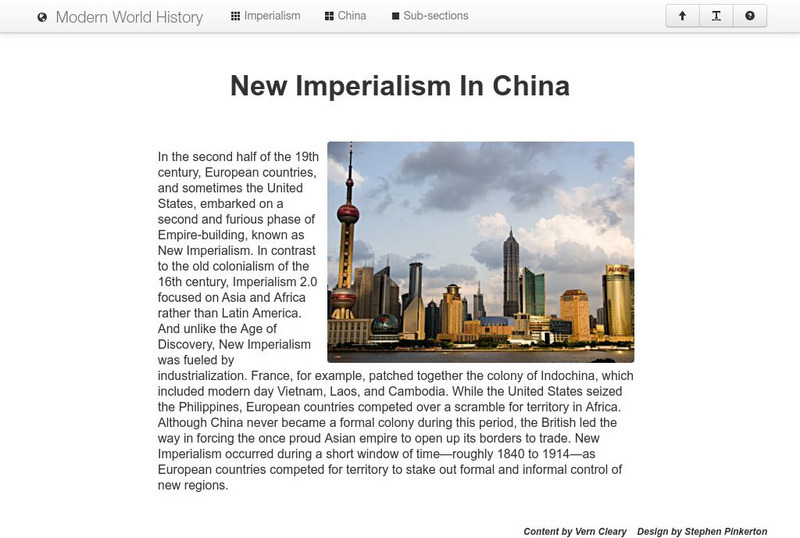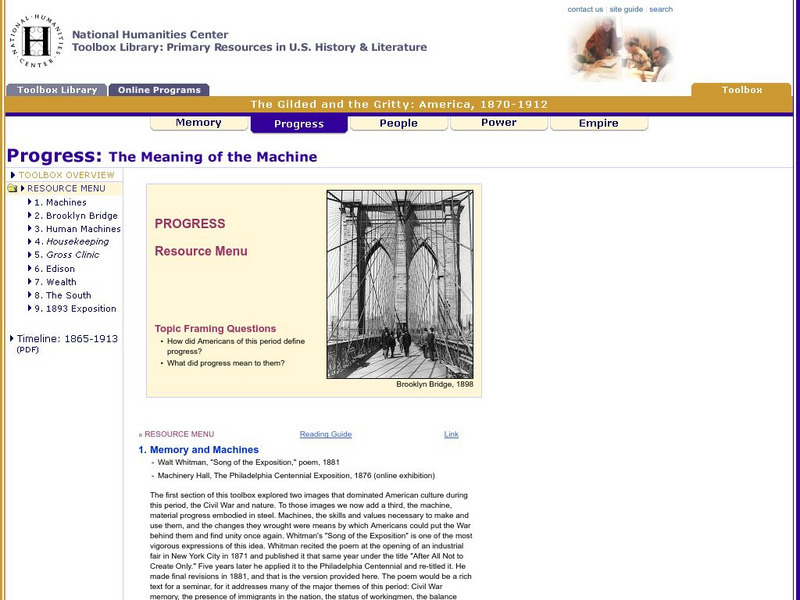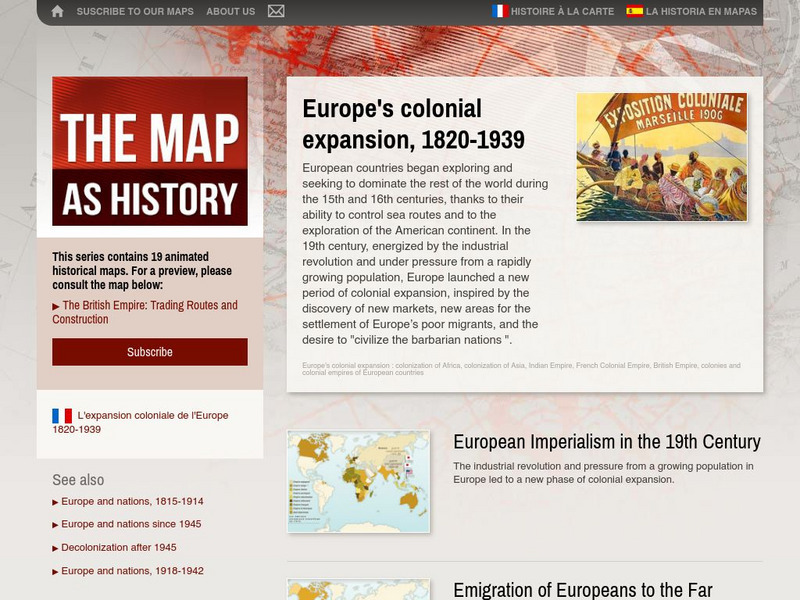Curated OER
Fall of Soviet Union/Rise of Chinese Communism
Ninth graders examine the reasons for the fall of communism in the Soviet Union and the rise of communism in China. They listen to a lecture and complete slot notes, listen to and read the lyrics to the song "We Didn't Start the Fire"...
Curated OER
Lesson 4. Killing Fields
Eleventh graders describe several of the WWI's bloodiest battles, track the battles' progression to determine advances made by leading nations, and write frontline journalistic accounts of one or more of the battles.
Curated OER
The Japanese Empire: The Beginning
Ninth graders explore empires by researching Japan's history. In this Japanese research lesson, 9th graders discuss the history of Japan and the elements of World War II that caused Japan to become an enemy of the United States. Students...
Curated OER
Children in the Fields: The Life of the Hispanic Child Laborer During California's Agriculture Explosion
Fourth graders examine the agriculture explosion in California in the late 1800's to the early 1930's. They analyze primary source material putting themselves into the shoes of a child laborer. They also gain an understanding of...
Curated OER
Europe 1871-1914
In this online interactive history worksheet, students respond to 10 short answer and essay questions about the Europe between the years 1871 and 1914.
Curated OER
Africa 1500-present: The Big Picture
In this African history study guide worksheet, students read a brief overview pertaining to the history of Africa from 1500 to the present.
Curated OER
Lesson 3. No One Spared
Eleventh graders, in groups, explore the devastation that World War I inflicted on millions of people around the world. They write a first-hand account of the impact of World war I.
Curated OER
World War II in the Pacific and the End of the War
Students study the World War in the Pacific. In this Geography lesson, students develop an awareness of key issues and events from the conflict. Students write a well-organized essay describing this event.
Curated OER
War and International Law:America’s Foreign Policy: A Brief History
High schoolers discover the history of American foreign policy. In this foreign policy lesson, students listen to their instructor present a lecture that presents a brief history of American foreign policy. High schoolers...
Curated OER
Munich: Peace in Our Time
Young scholars examine the Munich Agreement. In this World War II lesson, students analyze the agreement made among Germany, the United Kingdom, France, and Italy. Young scholars discuss the strengths and weaknesses of the agreement.
Curated OER
1876-1920 Word Search Puzzle
For this literacy worksheet, middle schoolers look for the words in the puzzle that are related to the theme of the word search. Spelling skills are worked on.
Curated OER
Investigation of the Aral and Salton Seas
Students become more environmentally conscious. They see that it may be too late to "save" the Aral Sea, but there is still hope to prevent the ecological collapse of the Salton Sea.
Georgia Department of Education
Ga Virtual Learning: World His: Industrial Revolution, Nationalism, Imperialism
Comprehensive unit covering 19th Century Industrial Revolution, Nationalism, and Imperialism. Multi-media resources, assignments, activities and assessment.
Tom Richey
Tom Richey: Modernization, Unification & Imperialism (1850 1914)
Study the modernization of Europe, the unification of Germany and Italy, and the New Imperialism in Africa and Asia with these resources. Find videos, lessons, and PowerPoint presentations.
PBS
Pbs Learning Media: Writing in u.s. History: Imperialism and Spanish American War
Trace the causes and debates that led to the Spanish-American War, including "yellow journalism" press coverage, President McKinley's declaration of war, and sentiments about imperialism. In this interactive lesson from WGBH, students...
Internet History Sourcebooks Project
Fordham University: Modern History Sourcebook: The Rise of Our East African Empire, 1893
This Fordham University site offers a primary source from a British Captain stating the argument for British imperialism of East Africa.
PBS
Pbs Learning Media: Primary Source: American Imperialism: Spanish American War
A collection of primary sources that explores the Spanish-American War.
Library of Congress
Loc: Germany
The political landscape in imperial Germany with its six parties (founding of the SPD) and their leaders. The struggles with Bismarck's rule are described. In the second part of the page, economy and population growth are discussed.
Other
Modern World History: New Imperialism in China
Fueled by industrialization, European countries began empire building in the late 1800's. How did this affect China who was never formally colonized? Read this short introduction to imperialism in the late 1800's to see the consequences...
Other
Modern World History: The Causes and Motivations for the Scramble for Africa
Industrialization led to the "scramble for Africa" by European countries seeking raw materials, markets, and cheap labor. However, other factors played a role such as political, ideological, and religious reasons. Examine these reasons...
Other
America's Best History: u.s. Timeline the 1900s
An illustrated timeline of events of the United States, which depicts a time of industrial purpose.
National Humanities Center
National Humanities Center: Toolbox Library: Progress, the Gilded and the Gritty: America, 1870 1912
Eighteen primary sources-historical documents, literary texts, and visual images-that explore the industrial, racial, and technological progress of the late-nineteenth century.
Other
The Map as History: Europe's Colonial Expanision 1820 1939
European countries began exploring and seeking to dominate the rest of the world during the 15th and 16th centuries, thanks to their ability to control sea routes and to the discovery of the American continent. In the 19th century,...
W. W. Norton
W. W. Norton & Company: Norton Anthology: Victorian Age Topics in Literature
This resource discusses four controversies that concerned the Victorians: evolution, industrialism, what the Victorians called "The Woman Question," and Great Britain's identity as an imperial power. Includes multiple-choice quiz and...


